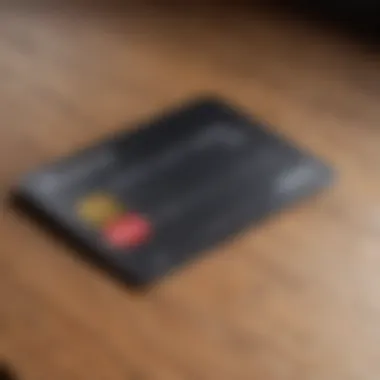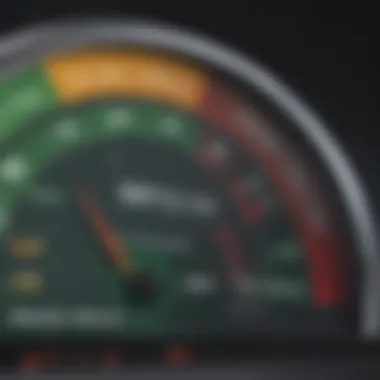Understanding Micro Center Credit Card: Minimum Credit Score Insights


Intro
Understanding the implications of a credit card, such as the Micro Center credit card, requires a clear grasp of personal credit scores and financial principles. This knowledge is crucial for effectively navigating financial options and making informed decisions.
The Micro Center credit card can be a valuable financial tool for consumers, but the assess for it is primarily contingent on a minimum credit score. Different factors, like payment history and levels of debt, can directly affect an individual's credit score.
When applying for the Micro Center credit card, a candidate should know the different aspects, from eligibility criteria to application procedures, and benefits tied to the card. Making informed judgements can lead to better financial management and open doors to other opportunities.
Understanding Loans
When considering a credit products like the Micro Center credit card, it is essential to understand the wider scope of loans and their basic principles.
Types of loans
Loans generally can be classified into various categories:
- Personal loans: Unsecured loans given for personal purposes, often used for purchases or debt consolidation.
- Student loans: Meant for funding education. These loans typically have reduced interest rates and options for deferment.
Loan eligibility criteria
This depends upon the type of loan. Common factors evaluated include:
- Credit score
- Frequency of income
- Existing debt to income ratio
Making sure to meet these criteria can pave the way for an easier application process and likely approval for financial assistance.
Pros and cons of taking out a loan
Pros:
- Can fulfill immediate financial needs
- Ability to establish or enhance credit score
Cons:
- Risk of incurring further debt
- Potential for higher amounts of interest depending on terms of the loan
Understanding these loans in detail is fundamental while applying for a credit card, as it determines one's financial health.
Navigating Credit Cards
Credit cards present differing opportunities and risks. Those interested in a Micro Center credit card should become familiar with the practical features of credit cards that apply.
Types of credit cards
Various types of credit cards can suit different needs:
- Cashback cards: Provide cash back on purchases made with the card.
- Rewards cards: Offer points or miles that can later be redeemed for products or travel expenses.
Credit card utilization tips
Tips to maintain a good credit score when using a credit card include:
- Keeping credit card balances low
- Paying dues on time every month
Avoiding common credit card pitfalls
There are a few situations among card holders to be wary of:
- Late payment fees can accumulate quickly.
- Overutilizing credit might harm your available credit limit.


Sustaining a legal and healthy financial profile is key when considering the Micro Center credit card.
By understanding how credit cards and loans function, individuals will be better equipped to make intelligent financial decisions that optimize their resources.
Epilogue
Possessing knowledge about credit cards and loans is indispensable for crafting a steady credit history. Successfully applying for the Micro Center credit card is simply one decision in a labyrinth of financial pathways, but awareness and preparation are key factors in this journey. Taking action, whether improving bad credit scores eval, or manage the multipurpose financial instruments can lead individuals towards more secure financial options and possibilities.
Prologue to Micro Center Credit Card
The Micro Center credit card is a crucial financial tool for those who frequently shop at Micro Center. This article dives into its various aspects, particularly emphasizing the importance of understanding the minimum credit score requirements for approval. Knowing these requirements aids potential applicants in making informed decisions regarding their personal finances.
Overview of Micro Center
Micro Center operates as a leading retailer specializing in electronics, ranging from computers to components and software. Established in 1979, it has built a loyal customer base in the United States. Micro Center combines retail operations with direct online sales, catering to both everyday consumers and tech enthusiasts. Therefore, its reputation within the electronics retail industry underscores the appeal of the Micro Center credit card, which offers unique benefits to its users.
What is a Micro Center Credit Card?
A Micro Center credit card is a store-branded card that facilitates shopping at Micro Center. It provides cardholders with various benefits, including special financing options and rewards on purchases made at Micro Center. These could encompass discounts, promotional offers on electronics, or early access to sales events. By obtaining this card, consumers can simplify their purchasing decisions and accumulate savings if they plan to invest in high-value items.
Understanding the card's structure allows individuals not only to maximize its benefits but also to investigate its impacts on overall credit health. Potential applicants should recognize the value of knowing their credit score before proceeding to application, ensuring an aligned strategy when approaching this financial option.
Credit Score Fundamentals
The understanding of credit scores is critical when considering the Micro Center credit card. Knowing the elements that make up a credit score empowers potential applicants to enhance their chances of getting approved. An individual's credit score reflects their larger financial health, which lenders review meticulously when deciding on application approvals. A good credit score not only opens doors for credit cards like Micro Center’s but may also influence interest rates, loan terms, and insurance premiums.
Understanding Credit Scores
A credit score is a numerical representation of a borrower's creditworthiness. Typically, it falls within the range of 300 to 850. Scores above 700 are generally categorized as good and above 750 as excellent. Various financial institutions, such as banks, use these scores to determine the likelihood of repayment by a borrower and help configure lending products suitable for that individual. The calculation of a credit score consists of various components:
- Payment History: This is the largest factor, accounting for around 35% of your credit score. Consistently making payments on time is essential.
- Credit Utilization Ratio: This considers the amount of credit you are using compared to your total available credit and usually affects about 30% of your credit score.
- Length of Credit History: A longer credit history may help your score, making up 15%.
- Types of Credit Accounts: Having a diverse range of credit—such as revolving credit and installment loans—contributes about 10%.
- New Credit: Applying for new credit can lower your score slightly, comprising another 10% of your overall credit score.
These factors mold a person’s financial footprint, and an awareness of how they operate provides context critical for any credit applications.
Factors Affecting Your Credit Score
Several key elements impact your credit score, and each requires attention for it's crucial to maintain or improve your credit ranking. Thoroughly understanding these factors can lead to actionable steps toward better credit health.
- Timely Payments: Make payments by their due date for all credit accounts. Late payments can severely impact your credit score.
- Minimize Credit Card Balances: Keep usage below 30% of your total available limit on any credit card to demonstrate low credit risk.
- Avoid Frequent Applications: Too many inquiries into your credit can signal risk to lenders, which may further diminish your score.
- Maintaining Old Accounts: Keeping older accounts active showcases credit history. Do not close these accounts, as it may shorten your average age of credit.
- Monitoring Credit Reports: Regularly checking your reports helps in identifying errors and managing disputes when necessary.
It’s paramount for anyone considering a Micro Center credit card to actively evaluate these factors. This understanding assists candidates in confirming they meet minimum credit score requirements effectively.
Minimum Credit Score Requirement for Micro Center Credit Card
Understanding the minimum credit score requirement for the Micro Center credit card is critical for potential applicants. An adequate credit score not only affects the approval process but also informs applicants about potential interest rates and credit limits. Securing favorable terms on a credit card can significantly influence one's overall financial health.
A minimum credit score plays a large role in determining whether an application is approved. Most credit cards, including the Micro Center credit card, seek applicants with a certain level of creditworthiness. If one’s score is near or beneath this threshold, it could lead to denial, which might project a negative image to most creditors.
Moreover, while a particular score is needed, other factors may impact the final decision. This article emphasizes understanding the nuances of these credit requirements, along with providing a solid foundation for improving one’s credit score if needed.
What is the Minimum Credit Score Needed?
Generally, Micro Center looks for a minimum credit score around 600 for approval. However, it can greatly vary depending on individual circumstances. That being said, meeting this benchmark does not guarantee approval; various additional factors play an essential role in the decision-making process.
It is advisable for applicants to check their credit reports before applying. Issues such as late payments, high credit utilization ratios, and bankruptcies could all result in a lower score, making it less likely to get approved. Checking in advance helps individuals be prepared and possibly improve their scores in advance.
A steady credit history can enhance one's likelihood of card approval significantly.
Comparing Micro Center with Other Retail Credit Cards
When evaluated against other retail credit cards, the Micro Center credit card holds a considered position. For instance, compare it with Lowe's Advantage Card or Best Buy Credit Card. These cards tend to also target similar market segments but might require higher minimum credit scores for competitive perks or larger rewards.


A notable distinction is the application criteria related to the benefits offered. While Micro Center may have lenient approval processes compared with others, the overall perks can also be lesser, depending on personal spending habits and needs.
Application Process for Micro Center Credit Card
The application process for the Micro Center credit card is a crucial stage for potential applicants. Understanding each step involved can significantly influence your outcome. Applying for a credit card should never be a hurried decision. Comprehensive knowledge about the process can help prevent unnecessary setbacks during approval. By familiarizing yourself with this procedure, you can position yourself advantageously.
Step-by-Step Application Guide
Applying for the Micro Center credit card can seem daunting, but breaking it down into manageable steps can ease confusion. Here’s a detailed guide to facilitat your application:
- Check Your Credit Score: Before application, assess your own credit score. While Micro Center typically expects a minimum score, knowing yours will guide your decision-making.
- Gather Required Information: You'll need several pieces of information on hand:
- Visit the Micro Center Website or Store: Applications can be initiated online or in-store. Visit the website to start the process or go to the nearest Micro Center.
- Complete the Application Form: Fill out the application form meticulously. Precision here can prevent processing delays.
- Submit Your Application: After completing, promptly review and submit the application. Double-check that all fields are accurately filled out.
- Monitoring the Application Status: After submitting, expect some processing time. You can check application progress online or by contacting customer service.
- Your Social Security Number.
- Annual income and employment details.
- Contact information, including your residency address.
What to Expect During the Approval Process
Once your application is submitted, it enters the approval phase. This stage plays a vital role in determining whether you will receive the Micro Center credit card.
- Processing Time: Approval can often take between a few minutes to several days, depending on various factors like your credit score and the information submitted.
- Notification Outcome: Most applicants will be notified via email or phone call. In some instances, additional information may be required for clarity.
- Possible Outcomes: Applicants tend to receive:
- Approval with credit limit specified.
- Denial, which often includes explanations for non-approval.
Understanding the timeline and expectations can ease anxiety. Delays may occur but remain calm and focused on improving your credit if needed.
Monitoring communication from Micro Center after submission can also help in planning your next steps on how to utilize your card positively. Familiarizing with the complete process from start to finish makes a considerable difference in navigating your credit options successfully.
Potential Benefits of the Micro Center Credit Card
The Micro Center credit card offers a spectrum of advantages that can enhance customer experience and financial flexibility. Understanding these benefits is essential not only for prospective cardholders but also for existing customers who might evaluate the overall value of their credit options. Each benefit typifies how the card optimally caters to the needs of tech enthusiasts and regular shoppers alike.
Rewards and Incentives
One of the main attractions of the Micro Center credit card is its reward system, which incentivizes purchases at Micro Center stores. Cardholders can expect to earn points for every dollar spent on qualified transactions. These points can be redeemed for future discounts, effectively giving customers a reason to return and make subsequent purchases.
The card’s reward structure is as follows:
- Earn 5% back in rewards on eligible purchases.
- Bonus Points during promotional campaigns, often tied to special events or product launches.
- Cash-back incentives for designated categories, such as tech items, accessories, and services.
Incentive programs like these can significantly improve the buying power of users over time with a strategic approach to shopping. Ideally, maximizing the rewards becomes straightforward—committing to regular purchases in designated quarters facilitates accumulating points just as much as pizza night incentivizes gathering with friends.
Exclusive Offers for Cardholders
The benefits extend beyond basic rewards and to exclusive offerings tailored specifically for cardholders. These promotions can come in many forms, past examples include discounted pricing, special financing plans, and early access to inventory during sales events.
Benefits for cardholders typically comprise:
- Birthday discounts, rewarding loyal customers with birthday deals.
- Early bird sales, providing first access collection during clearance or holiday sales.
- Financing deals with low-interest rates, allowing cardholders to manage larger purchases more effectively.
Such exclusive offers solidify the Micro Center credit card's allure. They create a sense of loyalty among users, encouraging them to maintain a continual relationship with the brand. It isn't merely about making purchases but rather feeling like part of a community with valued reciprocation.
Opting for a Micro Center credit card is not just about financing options. It's also about participating in value-added services unique to this brand engagement.
Considering this information about rewards and special offers allows potential applicants to make informed comparisons against other finance instruments. Understanding these benefits may assist in offsetting other fees or costs that traditional cards might incur.
Impact of Credit Score on Approval Chances
The topic of how credit scores influence approval chances is neurotically relevant for those considering the Micro Center credit card. Before entering an agreement, understanding this relationship is necessary for making informed financial choices. Credit scores directly link to the perceived creditworthiness of an individual. Besides affecting interest rates and available credit limits, they play a pivotal role in determining whether a credit application will be approved.
In essence, having a solid credit score opens doors to better offers. In the context of retail cards like the Micro Center credit card, stakeholders should take their scores seriously. Often it can mean the distinction between getting a card and being declined. Factors considered in an application typically include credit history, outstanding debt, payment punctuality and the length of the credit history.
Commands must be understood regarding what constitutes a good credit score, common thresholds in retail credit applications, and the overall landscape of lending that can impact one’s chances engagingly. Bear in mind, a low-modern-than-average credit score may not outright disqualify an applicant, but markedly reduces chances while defaulting to provider's offer.


A strong credit score not only means improved likelihood of approval but also indicates greater financial responsibility to lenders.
Understanding Approval Odds Based on Credit Scores
Achieving approval for the Micro Center credit card largely hinges on the credit score. Knowledge of the tiers of credit scores often used in this process helps specify approval odds. Their commonly accepted breakdown can categorize scores as follows:
- Excellent: 750 and above
- Good: 700 - 749
- Fair: 650 - 699
- Poor: Below 650
Within this classification, eligibility for the Micro Center credit card compellingly scales with the applicant's profile. While unique policies vary for each lender, many lean toward requiring at least a 'fair' score for approval. This ensures credit models capture diverse consumer risk behaviors without grouping everyone into generic qualifiers. However, it is pondered without argument that a 'good' credit score grants a much stronger case for approval and often paves the way for better terms through assured trust.
Additionally, applicants are advised to scrutinize information regarding utilization rates on existing credits and even requests for previous credit history inquiries; factors that can have significant amounts of bearing detrimental to scores and, by extension, approval chances. Clarity in obtaining various data can forge pathways towards more than suitable financial outcomes.
Strategies to Improve Your Credit Score
Those seeking to elevate their application feasibility often explore avenues to enhance their credit scores. Understanding that bad scores stem from certain missteps yields guidance. Consider prioritizing key strategies that can amount to significant improvements:
- Regularly Review Your Credit Reports: Errors create unnecessary setbacks. Gentle care and meticulous attention help catch discrepancies promptly. Visit AnnualCreditReport.com to procure free copies once a year.
- Pay Bills on Time: Habitual punctual payments cultivate positive history and are critical to maintaining or improving overall scores.
- Reduce Credit Portfolios: Display control over excited borrowing. High levels of outstanding debts can deter lenders sensitive about risk.
- Keep Utilization Below 30%: Utilize encouragingly less than credit limits, demonstrating credible management capacity.
- Limit Hard Inquiries: When seeking new credit, fewer simultaneous applications lead to better performance global outlooks. Each endeavor invokes applications requiring checks that tend subtract from valued score results.
Impropecting personal stewardship and using available resources to nurture strong scores will result in enhanced financial patterns benefiting future engagements.$code
Exploration into these tactics coupled with persistence can propel improved standings through temporal patience and foundational professional efforts adding substantial approval advantages. The steps detailed are backed through credibility’s proven validity in responsible financial health.
Alternatives to the Micro Center Credit Card
Considering alternatives to the Micro Center credit card is essential for individuals weighing their options in retail and general credit. While the Micro Center card has its specific benefits and demographic, there are numerous alternatives that may provide advantages depending on personal financial situations. These options should be assessed based on so many factors, including interest rates, rewards, and the overall spending habits of the cardholder.
Other Store Credit Cards
Store credit cards offer unique benefits, especially when used at specific retailers. These cards often include promotions, discounts, and points for spendings that can be used towards future purchases. Here are a few notable examples:
- Best Buy Store Card: Similar to the Micro Center credit card, this card offers rewards on tech purchases. Cardholders can benefit from special financing offers, particularly during seasonal sales.
- Home Depot Credit Card: Focused on home improvement purchases, this card allows users to save on large buys with deferred interest loans over specific amounts.
Evaluating these cards can help consumers make specialist purchasing decisions for electronics or home supplies. Always read the terms and conditions closely, as high-interest rates can apply if payments are not settled promptly.
General Credit Cards with Better Terms
When considering an alternative to the Micro Center credit card, many may find that general-purpose credit cards offer more flexibility and potentially better terms. Cards such as the Chase Freedom Unlimited or the Citi Double Cash Credit Card provide cashback on a broader category of purchase. These cards usually waive annual fees and offer introductory offers, making them good options for healthy spending.
Some benefits include:
- Wide acceptance, allowing use across numerous merchants, unlike store-specific cards.
- Flexible rewards systems that may better suit personalized spending patterns monthly.
Ultimately, while the Micro Center credit card may fit a niche scenario for tech purchases or customer loyalty, exploring these other options can reveal cards that might align more closely with comprehensive financial goals. Evaluate terms, fees, and benefits to make an informed choice without compromising financial strategy.
"A well-chosen credit card can significantly ease the financial burden of large purchases when selected with due diligence."
Finale
Understanding the Micro Center Credit Card and its associated minimum credit score requirements is crucial for individuals considering applying for this financial product. This conclusion synthesizes various factors that can influence application approval and the potential rewards of using the card.
Summary of Key Points
The insights gathered throughout this article reveal several key elements:
- Minimum Credit Score Requirement: A revenue credit score can support your approval chances.
- Application Process: Understanding each step ensures a smoother experience when applying.
- Benefits: The card provides rewards and exclusive discounts for frequent Micro Center shoppers.
- Impact on Credit: A good understanding of your credit score and how it affects your approval odds can be beneficial for long-term financial planning.
- Comparison with Alternatives: Knowing what other options exist helps consumers make informed choices regarding store credit cards versus general credit accounts.
By approaching the Micro Center credit card with well-rounded knowledge, one can better navigate the various financial implications involved.
Final Thoughts on Micro Center Credit Card and Credit Scores
When considering a Micro Center credit card, it’s essential to balance the allure of benefits with an awareness of total financial health. Good credit scores not only increase approval chances but also can influence the terms you receive. Your credit score is a powerful tool that proactively shapes your future financial opportunities.
Growth in credit score over time can provide more favorable terms across various credit applications.
A strategic focus on building and maintaining your credit score can bulk gains with long-term advantages in financial dealings.
As you think about the Micro Center card, reflect on your broader financial goals as well. Evaluate whether the rewards offered genuinely enhance your buying behavior or if other credit lines might better serve your needs. Understanding these dynamics is the cornerstone to achieving wise financial decisions.







